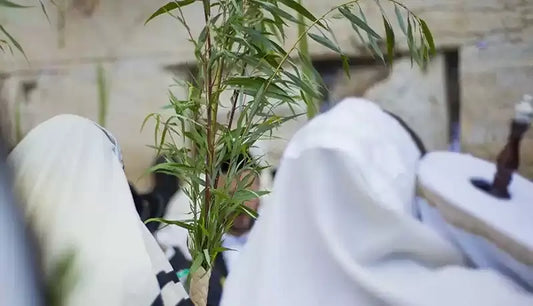Rabbi Hayim Asher Arking
Rabbi Ezra Ghodsi
The gradual entry to the most reflective day in our history starts with the Fast of Tamuz and the weeks that follow; then as we enter Rosh Hodesh Av we step up our cognizance of mourning the Bet Hamikdash; the week of Tisha B’Av even more, and now the eve of Tisha B’Av we intensify our seriousness as we enter into the actual day of mourning.
The Seudat Hamafesket is the point where we segue into the Fast as we are yet eating, however sitting on the floor and create the mood of Tisha B’Av.
What do we eat for the Se’udah Hamafseket?
The Se’udat Hamafseket is the last meal prior to the fast. It should consist of the bare minimum; essentially just bread and water. The custom is to also eat something round; either an egg or lentils, as these are things eaten by mourners since they represent the circle/cycle of life. It is important not to eat a big meal too late in the day so that one will be at least a little hungry for the Se’udat Hamafseket, and it can actually be considered a meal.
Are a rice and lentils considered one or two foods?
It is forbidden to eat more than one cooked food at the Se’udat Hamafseket, so as to demonstrate our mourning by restricting what we eat. Even one type of food which is prepared in two different ways, is not allowed (e.g. a hard-boiled egg and a soft-boiled egg). However, if the two foods are normally cooked together in one pot and eaten together as one dish (such as rice and lentils), then it can be served at the Se’udat Hamafseket as it is considered one food.
How do we sit at the Se’udah Hamafseket?
The custom is to sit on the floor. Everyone should separate from each other with a solemn attitude, mourning the Bet Hamikdash. If three adult men are present, they should sit in separate corners of the room, to avoid the requirement to do zimun.
How high can my chair be?
By the Se’udat Hamafseket, one should sit on the floor (or anything less than a tefah high - 3 to 3.2 in.). An elderly or pregnant woman who finds this too difficult, can sit on a cushion or stool that is lower than 3 tefahim high (9 to 9.6 inches). In regard to Tisha B’Av itself, everyone is permitted to sit on a low cushion or pillow, and many also permit a stool of lower than three tefahim.
When sitting on the floor, one should still stand for a parent, rabbi, or elderly person.
Can I drink tea or coffee by the Se’udat Hamafseket?
Tea and coffee are not considered “cooked foods,” and are therefore halachically permitted. However, it is praiseworthy to be stringent and refrain from extra enjoyment at the time that we start mourning the Bet Hamikdash.
Can I still eat after Birkat Hamazon before the fast starts?
According to some, it is preferable to have in mind to not accept the fast before reciting Birkat Hamazon. If one did not, he can still eat or drink, even if he planned on accepting the fast. However, if one verbalized his acceptance of the fast, then he cannot eat or drink and all the other restrictions of the fast apply at that time.
When does the fast start?
The fast starts at shekia (approximately 7:55 in the NY/NJ area). At this time all the laws of the fast begin: 1) No eating or drinking. 2) No washing. 3) No applying creams or oils to one’s skin. 4) No leather shoes. 5) No marital relations. At this time also, one should start sitting on the floor.
Can I wash the dishes and clean up the house on Tisha B’Av?
One should not sweep, wash the floors, wash dishes, or engage in any extended clean-up until after midday, hatzot, of Tisha B’Av (approx. 1:00 PM in the NY/NJ area). Therefore, one should endeavor to clean up before the fast starts.
Can I brush my teeth?
Tisha B’Av is more stringent than regular fasts and it is not permitted to rinse out one’s mouth or brush teeth. If one is very uncomfortable or has bad breath, he can use mouthwash (without rinsing with water afterward), but he should keep his head facing down so it does not get swallowed.
Can I take medicine for a headache?
If one has a headache he may swallow a pill without water, provided that it does not have a flavored coating. Other medications are also permitted, however, vitamins and health items should not be taken. If one is unable to swallow the pill without water, a rabbi should be consulted.
How do I wash my hands?
In the morning, one should wash his fingers up to the knuckles three times. One who has the custom during the year to wash their hands three times after entering a restroom may do so on Tisha B’Av also, but only up to the knuckles.
One who is sick and washing for bread should wash his hands like they do throughout the year – up to the wrist. Similarly, the kohanim should also wash up to the wrist, but they should only wash each hand one time. When a Levi washes his hands prior to washing the kohanim’s hands, he can only wash up to the knuckles.
My hands got dirty, can I wash them?
Any washing for cleanliness, (such as for unclean hands or even to remove gunk around the eye in the morning), is permitted. However, only the dirty area may be washed, and not the rest of the hand. If one touches his shoe, only the part of the hand that touched the shoe should be washed. One exception is if someone touched a covered part of their body, which would require washing before reciting a beracha or praying, then that hand should be washed up to the knuckles.
Is it permitted to wash my hands with soap?
Applying creams, oils, etc. is only prohibited if done for pleasure or enjoyment. However, when done for cleanliness, such as if one’s hands are dirty and they need soap to clean them, it is permitted. It is also permitted to use Purell, if necessary.
Can I use deodorant?
Deodorant, (even with a good smell), since it is used for cleanliness and not for pleasure, it may be used.
What if only part of the shoe is leather?
Shoes with even a leather sole or leather top may not be worn. However, if there is a small strip of leather intended for decorative purposes only, it may be worn. Similarly, a pair of flip-flops that has only a thin strap to hold the foot in place and does not protect the foot, is also permitted.
What if I don’t have any non-leather shoes?
If one is worried that he will get hurt or dirty, then he may wear leather footwear outside if he has no other option. For example, if it is pouring rain or muddy, one may wear appropriate shoes or boots outdoors to remain dry and clean. However, they should be removed immediately when entering the house, shul, or car.
Can kids wear leather shoes?
Young children should not wear leather shoes unless they have no other option. If they have reached the age of hinuch, (around six years old - depending on their level and understanding), it is preferable that they not wear leather shoes, even if they do not have any other option.
Can I read Tehillim?
On Tisha B’Av the regular study of Torah is not permitted, as Torah brings a person joy. However, one should study the Gemarot and Midrashim that discuss the destruction of the Bet Hamikdash. One may also study the laws of Tisha B’Av or the laws of avelut. It is also permitted to study Sefarim that encourage a person to reflect on his sins and do teshuva.
Reading Tehillim is also like studying Torah, and should not be done, unless one is praying for something specific such as a sick person. Therefore, one who is unable to study the parts of Torah permitted on Tisha B’Av and wants to read his set amount of Tehillim should read the Tehillim as prayer for a sick person or for another need.
Can I wish someone good morning?
Due to the somber mood of the day, one should not greet their friend with common greetings such as ‘hello’, ‘good morning’, ‘how are you?’, and the like. If one was greeted by somebody who is unaware of this Halacha, he should respond in a soft and serious tone.
What type of work is prohibited on Tisha B’Av?
One may not conduct any form of business, or buy/sell anything including online purchases. (If there is potential for a loss, or if it is a rare opportunity, a Rabbi should be consulted). Even before hatzot, it is permitted to buy food that will be needed for after the fast.
Can one smell besamim?
One should not smell besamim on Tisha B’Av. In order to recite the required 100 berachot, one should listen to the berachot on keriat HaTorah and have in mind to fulfill his obligation with that.
What else should we do or not do?
One should not engage in fun activities or socialize, as the mood of the day should be one of mourning and solitude, to enable us to reflect on how we can rebuild the Bet Hamikdash. One should even refrain from sitting with a child on his lap for no reason, so he won’t end up playing with him. However, it is permitted to do so for a specific purpose, such as to calm the child.
What can be done after hatzot?
After hatzot (approximately 1:00 p.m. in the NY/NJ area) one may sit on a regular chair. At that point, it is also permitted to start preparing food and cleaning up the house. One may also wash dishes (it is not necessary to wear gloves). All other restrictions are still in place until after the fast is over.
May we merit to see the building of the Bet Hamikdash speedily in our days, Amen.



